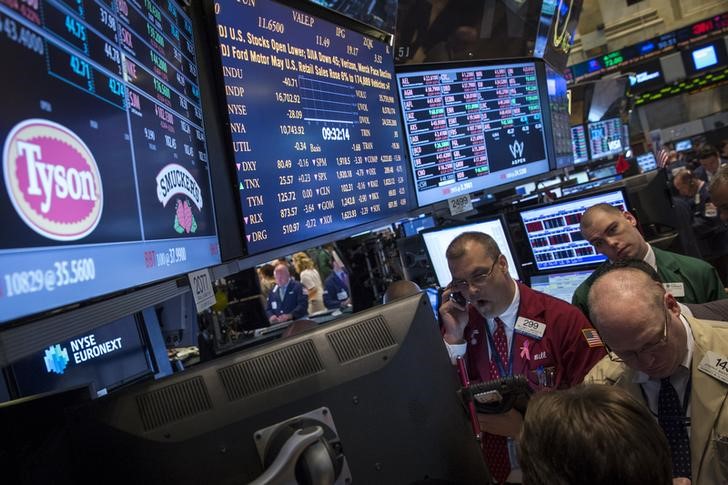(Bloomberg) -- The clock is ticking for the U.S. to avoid a meat shortage as sick workers force more slaughterhouses to shut down.
Tyson Foods Inc (NYSE:TSN). on Wednesday said it’s idling its largest pork plant, making it at least the sixth major U.S. meat facility to shutter in the last few weeks. Currently, about 15% of hog-slaughtering capacity is completely off line, and there are also additional slowdowns at pork, beef and poultry companies across the nation.
Meat prices are starting to surge on the disruptions. But with slaughterhouses closing, farmers don’t have a market for their animals. That’s causing hog futures to drop, potentially creating a situation where pigs get euthanized and buried as supplies back up. Meanwhile, retail costs may rise as grocery stores mandate rationing on pork chops.
Things are so dire that Iowa, the biggest hog state, activated the National Guard to help protect supplies.
“Meat shortages will be occurring two weeks from now in the retail outlets,” Dennis Smith, a senior account executive at Archer Financial Services, said, citing industry sources. “There is simply no spot pork available. The big box stores will get their needs met, many others will not.”
Much has been made of the frozen inventories that are kept in warehouses, which could help cushion the blow of plant closures -- as long as they don’t last very long. While there’s hundreds of millions of pounds of frozen meat in U.S. warehouses, the supplies account for only a fraction of what’s typically produced in any given month.
In March, frozen pork inventories dropped 4.2% from February, U.S. government data showed on Wednesday. It was biggest drop for the month of March since 2014, and the decline came before the major slaughterhouse shutdowns that started in April.
“For all the talk of cold-storage supplies, it’s just never a lot,” Bob Brown, an independent market consultant in Edmond, Oklahoma, said by telephone of supplies of pork, beef and poultry. “It’s roughly a week’s worth of production in the freezer.”
The Tyson facility in Waterloo, Iowa, will stop running mid-week until further notice, the company said, adding that reopening would depend partly on the results of employee testing for coronavirus. Outbreaks have also forced closures for JBS SA in Minnesota and Colorado and Smithfield Foods Inc. in South Dakota. A Tyson plant in Columbus Junction, Iowa, has resumed some operations after an earlier halt, as has been reported for a National Beef Packing Co. facility in the state.
On Wednesday, Hormel Foods Corp (NYSE:HRL). said that multiple employees at its Jennie-O turkey plant in Willmar, Minnesota, tested positive for coronavirus. The plant is continuing to operate.
“It means the loss of a vital market outlet for farmers and further contributes to the disruption of the nation’s pork supply,” said Steve Stouffer, head of Tyson Fresh Meats.
Shutdowns for slaughtering plants are cascading through meat supply chains and causing weird dislocations for prices -- finished products are surging, while farmers are getting paid much less for animals.
Prices for pork bellies, the cut that’s turned into bacon, have more than doubled in just the four days through Tuesday on supply concerns. With so many fewer hogs moving through slaughter, Smithfield Foods had to shutter facilities in Wisconsin and Missouri that turn pork into finished products like bacon and sausage.
Meanwhile, prices for the hogs themselves are plummeting. There are way more pigs than can be processed right now, so animals are backing up on farms. Hog futures traded in Chicago are down about 21% in April.
Meat Packer Margins
That means sky-rocketing margins for meat packers -- the folks who do the slaughtering and turn pigs into chops and bacon. They’re paying less to farmers to get the animals, and then turning around and getting higher prices for their finished products. Pork margins are up about 340% since April 1, according to data from HedgersEdge.
Some meatpackers are giving raises and bonuses to workers, in part to protect against rising absenteeism at plants.
Shutdowns haven’t been limited to the U.S.
Almost half of Canada’s beef-processing capacity has been halted after a closure for Cargill Inc. this week in Alberta. A JBS plant in the province has also slowed production. Many ranchers in the region have been left with nowhere to sell their cattle. Canada exports about 50% of its beef.
“The solution, of course, is to make sure the plants can be back up and running as soon as possible,” Marie-France MacKinnon, spokeswoman for the Canadian Meat Council, said in an email.
(An earlier version corrected the day of week in second paragraph. Adds March cold-storage figures in seventh paragraph, cases for turkey plant in 10th)
©2020 Bloomberg L.P.
